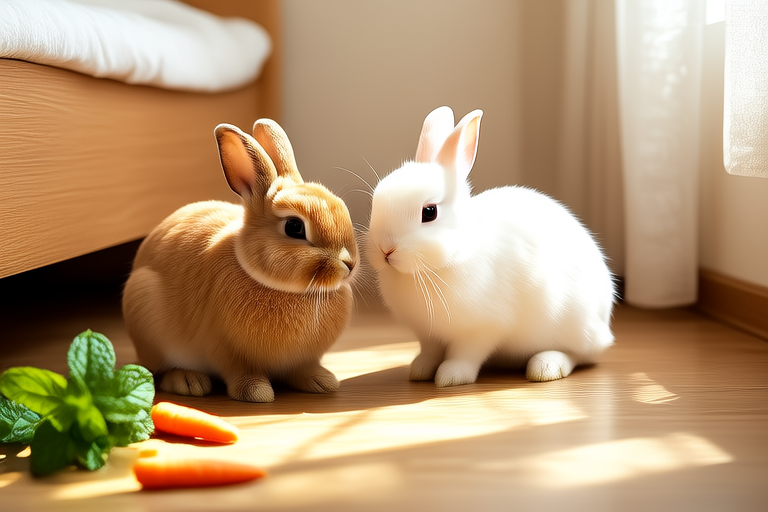Adorable Dutch Dwarf Rabbits: Perfect Pets for Small Spaces
Dutch dwarf rabbits have become increasingly popular among pet owners, particularly those who live in small spaces. These charming creatures offer a delightful combination of cuteness, ease of care, and adaptability that makes them ideal companions for apartment dwellers or anyone with limited space. This article delves into the unique characteristics, care requirements, and suitability of Dutch dwarf rabbits as pets for small living spaces.
The Charm of Dutch Dwarf Rabbits
Dutch dwarf rabbits are one of the smallest breeds of domesticated rabbits, typically weighing between 1.8 to 2.3 kg (4 to 5 pounds). Their petite size is complemented by their endearing appearance, featuring short, dense fur and striking markings that include white patches and contrasting colors like black, chocolate, or blue. With a lifespan of around 8 to 12 years, these rabbits provide long-term companionship and joy.
Suitability for Small Spaces
One of the most appealing aspects of Dutch dwarf rabbits is their suitability for small living spaces. Their diminutive stature means they require less room than larger rabbit breeds, making them perfect for apartments, condos, or homes with limited outdoor areas. Despite their small size, Dutch dwarfs are full of personality and energy, offering companionship without overwhelming your living environment.
Housing Requirements
Providing a safe and comfortable living space is crucial for the well-being of your Dutch dwarf rabbit. A spacious indoor cage or hutch is essential, ensuring that your pet has ample room to move around, stretch, and play. The cage should be at least 45 cm x 60 cm (18 inches x 24 inches) for a single rabbit, but ideally, you should aim for larger dimensions to allow more freedom of movement.
Line the bottom of the cage with soft bedding material such as straw or shredded paper to create a cozy sleeping area. Ensure good ventilation and protection from drafts. Additionally, consider placing the cage in a quiet corner of your home away from direct sunlight, noise, and potential predators.
Feeding and Nutrition
A balanced diet is vital for maintaining the health and vitality of your Dutch dwarf rabbit. Their primary food source should consist of high-quality hay, which aids in digestion and dental health. Offer fresh hay daily, along with a measured amount of pellets designed specifically for rabbits. Fresh vegetables and fruits can be given in moderation as treats, but avoid feeding too many sugary or starchy foods, as these can lead to obesity and other health issues.
Always provide access to clean, fresh water. A water bottle attached to the side of the cage is preferable, as it prevents spillage and keeps the water clean. Regularly check the water level and replace it when necessary.
Exercise Needs
Despite their small size, Dutch dwarf rabbits are active and playful animals that require regular exercise to stay healthy. Allow your rabbit supervised time outside of its cage each day to explore and stretch its legs. A rabbit-proofed room or designated area within your home provides a safe space for your pet to hop, jump, and play. Always supervise your rabbit during playtime to prevent accidents.
In addition to physical activity, mental stimulation is important for your rabbit’s overall well-being. Provide toys and accessories such as tunnels, chew toys, and cardboard boxes to keep your rabbit entertained and engaged.
Bonding with Your Dutch Dwarf Rabbit
Building a strong bond with your Dutch dwarf rabbit requires patience, consistency, and gentle handling. Initially, approach your new pet slowly and calmly, allowing it to become familiar with your scent and presence. Spend time sitting near the cage, talking softly, and offering treats to establish trust.
Once your rabbit feels comfortable, begin handling it gently, supporting its body and hindquarters. Be patient if your rabbit initially resists; some rabbits take longer to acclimate to human interaction. Regular interaction and positive reinforcement will help strengthen your bond and ensure a happy, well-adjusted pet.
Grooming and Care
Dutch dwarf rabbits have short, dense fur that requires minimal grooming. Brush your rabbit weekly to remove loose hair and prevent matting. During shedding seasons, increase brushing frequency to twice a week. Bathing is generally unnecessary unless your rabbit gets very dirty, as it can stress your pet and strip natural oils from its skin.
Pay attention to your rabbit’s nails, trimming them every few weeks to prevent overgrowth. Consult a veterinarian or experienced groomer for proper nail trimming techniques to avoid cutting the quick, which can cause bleeding and pain.
Common Health Issues
Like all animals, Dutch dwarf rabbits are susceptible to certain health issues. Regular veterinary check-ups and preventive care can help identify and address potential problems early. Some common health concerns include:
- Obesity: Maintaining a healthy weight through proper diet and exercise is crucial for preventing obesity-related conditions.
- Tooth Problems: Overgrown teeth can cause discomfort and difficulty eating. Regular dental check-ups can help catch and treat these issues promptly.
- Respiratory Infections: Cold temperatures, poor ventilation, and overcrowded living conditions can contribute to respiratory infections. Keep your rabbit’s environment clean and well-ventilated.
- Urinary Tract Stones: Providing plenty of hay and encouraging frequent urination can help prevent the formation of urinary tract stones.
Why Dutch Dwarf Rabbits Stand Out
Dutch dwarf rabbits are perfect pets for small spaces due to their compact size, friendly nature, and low-maintenance care requirements. Their adaptability to confined living areas and ability to thrive in indoor environments make them ideal companions for apartment dwellers or those with limited outdoor space. By providing proper housing, nutrition, exercise, and affection, you can ensure a happy and healthy life for your Dutch dwarf rabbit.
With their charming personalities and easy-to-manage needs, Dutch dwarf rabbits offer a rewarding and fulfilling pet ownership experience. Whether you’re a first-time pet owner or looking for a new furry friend, these delightful creatures are sure to bring joy and companionship to your home.
